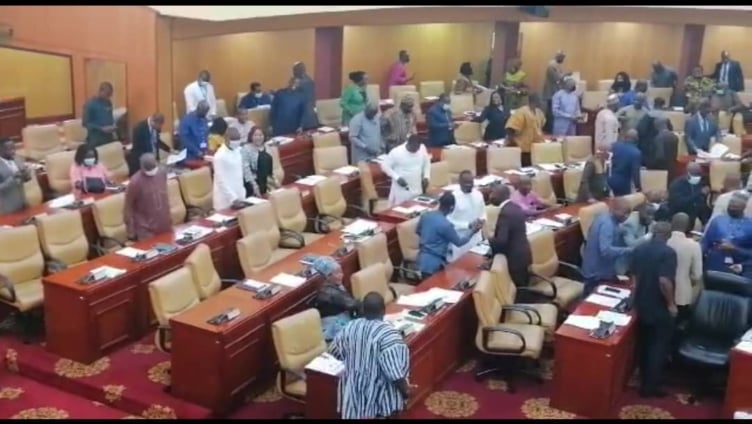The political landscape of Ghana witnessed a dramatic upheaval as the New Patriotic Party (NPP), the minority party in Parliament, staged a conspicuous walkout during the swearing-in ceremony of Ewurabena Aubynn, the National Democratic Congress (NDC) Member of Parliament-elect for Ablekuma North. This act of protest, unfolding under the watchful gaze of Speaker Alban Bagbin, stemmed from the NPP’s deep-seated discontent with the recently concluded parliamentary rerun in the constituency, which they allege was riddled with “serious irregularities.” The NPP’s boycott underscores the simmering tensions and deep distrust that permeate Ghana’s political environment, highlighting the fragility of democratic processes and the potential for escalating conflict in the face of contested electoral outcomes.
The rerun election in Ablekuma North became necessary after the Electoral Commission (EC) nullified the initial December 2024 results. The original election was marred by controversies surrounding the use of unauthenticated pink sheets, the official documents used to record vote tallies, and widespread allegations of electoral fraud. These irregularities cast a shadow over the legitimacy of the initial results, prompting the EC to order a rerun in 19 polling stations. Despite the EC’s efforts to ensure a fair and transparent rerun, the NPP maintains that the process remained compromised. They allege that voter intimidation, suppression tactics, and procedural violations tainted the rerun, undermining the integrity of the outcome and casting doubt on the validity of Aubynn’s victory.
Ewurabena Aubynn, representing the NDC, emerged victorious in the rerun, narrowly defeating her NPP opponent, Akua Afriyie, by a margin of just 209 votes. Aubynn secured 34,090 votes, while Afriyie garnered 33,881. However, the NPP vehemently rejected the results, maintaining that the rerun was far from free and fair. Minority Chief Whip Frank Annoh-Dompreh, speaking on behalf of the NPP, articulated their position, stating, “We cannot legitimize what we believe was a flawed and compromised process.” This statement encapsulates the NPP’s unwavering stance, signaling their refusal to accept the outcome and their determination to pursue alternative avenues to challenge the results.
The NPP’s dramatic walkout, while a powerful symbol of their dissent, did not halt the swearing-in ceremony. Aubynn was duly sworn in by Speaker Bagbin in the presence of the NDC Caucus and other dignitaries. With Aubynn officially assuming her parliamentary seat, the NDC now commands a two-thirds majority in Parliament, a significant development with far-reaching implications for Ghana’s political landscape. This supermajority grants the NDC considerable power to influence key legislative decisions, push through constitutional amendments, and control appointments to critical positions. The shift in parliamentary power dynamics has further exacerbated the political tensions, intensifying the standoff between the NPP and the NDC.
The NDC celebrated Aubynn’s swearing-in as a triumph for democracy and electoral justice, asserting that the rerun reflected the will of the people. They maintained that the EC had conducted a credible process and that the results were a legitimate reflection of the electorate’s preferences. This stance stands in stark contrast to the NPP’s perspective, creating a deep chasm between the two parties and highlighting the polarizing nature of the electoral dispute. The divergent interpretations of the rerun underscore the challenges facing Ghana’s democratic institutions and the urgent need for mechanisms to address electoral disputes in a transparent and credible manner.
The standoff surrounding the Ablekuma North election marks a troubling escalation in Ghana’s already charged political atmosphere. The NPP’s vow to challenge the legitimacy of the rerun through legal and parliamentary channels sets the stage for protracted legal battles and further political maneuvering. The tensions simmering beneath the surface threaten to boil over, especially as the country prepares for crucial legislative and governance reforms. The dispute over the Ablekuma North election serves as a microcosm of the broader challenges facing Ghana’s democracy, raising concerns about the fairness and transparency of electoral processes and the potential for political instability. The ability of Ghana’s institutions to navigate this contentious period and uphold the principles of democracy will be a critical test of their strength and resilience.


